From Bottle to Flake: How rPET Flakes Drive the Circular Economy
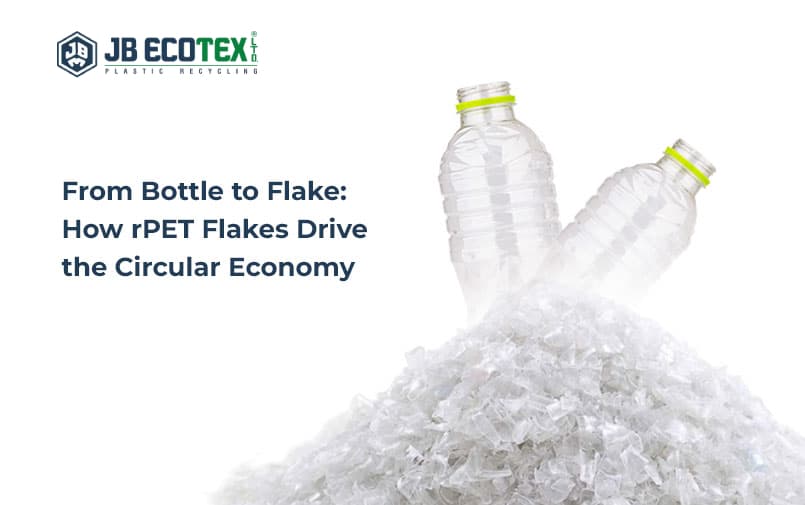
A bottle finishes its life in a consumer’s hand. For most, the next step is disposal. For JB Ecotex, the journey is only beginning.
Every day, post-consumer bottles are collected, sorted, and transformed into rPET flakes. These flakes are more than shredded plastic. They are the raw material for packaging trays, polyester yarn, strapping lines, and, most importantly, for B2B resin production that keeps food-grade packaging moving.
As global packaging laws change, rPET flakes have become one of the most crucial links in the supply chain. Converters, resin producers, and packaging brands are relying on flakes that are clean, traceable, and ready for their production lines.
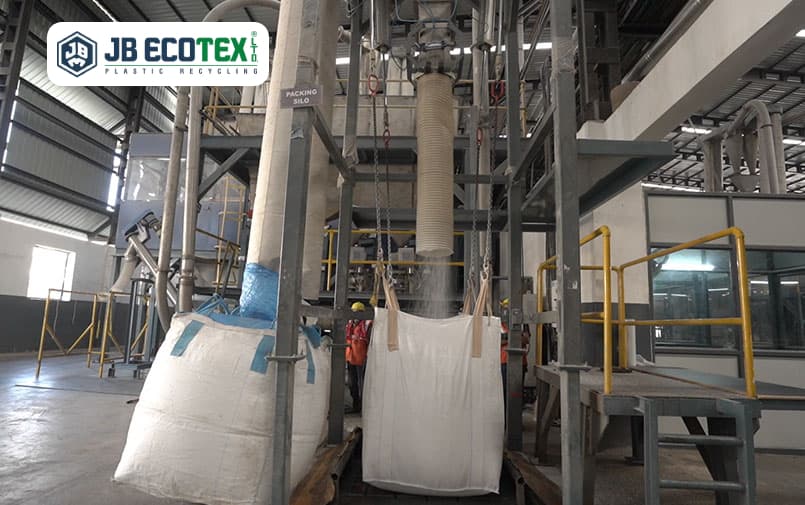
What Are rPET Flakes and Why They Matter for Manufacturers
rPET flakes are the shredded, cleaned, and processed form of PET bottles that re-enter the value chain as a new input. They are different from pellets or fibres because they serve as a mid-stage feedstock. Manufacturers purchase flakes to convert them into resins, fibres, or sheets depending on their need.
For RPET raw material buyers, flakes are a flexible choice. They can be adjusted in-house for IV levels, blended with virgin PET, or directed into processes that require specific clarity or crystallinity.
Flakes also carry traceability. A bale collected, sorted, and tested produces a certificate that buyers can use for regulatory and audit purposes. This documentation is essential for food packaging converters and resin producers working under strict compliance.
How Hot-Washed PET Flakes Are Produced
Before PET flakes can be used, bottles must pass through a process that ensures cleanliness and safety. At JB Ecotex, the process follows strict mechanical steps.
1. Collection – Bottles are sourced from a national collection network.
2. Sorting – TOMRA Near-Infrared scanners and manual sorting remove PVC, PP, PE, and non-PET.
3. Crushing – Bottles are shredded into smaller flakes.
4. Washing – Multi-stage hot washed PET flakes cleaning removes glue, labels, and contaminants.
5. Separation – Float-sink methods and optical sorting refine the output.
6. Drying – High-vacuum drying reduces moisture levels.
7. Testing – Each batch is tested for IV, PVC, metals, bulk density, and colour.
8. Packing – Flakes are sealed in 1000 and 1100 kg jumbo bags, labelled, and palletised.
This stepwise approach ensures every flake is suitable for downstream processes such as extrusion, spinning, and resin pelletisation.
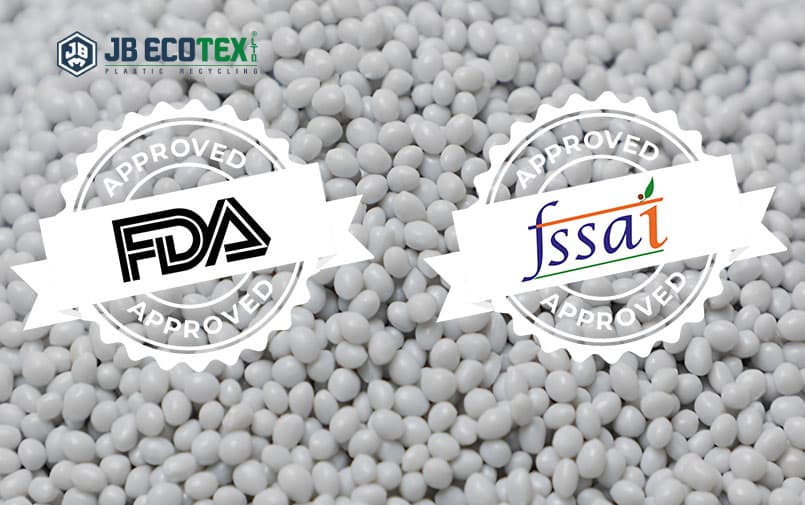
rPET Flakes for B2B Resin Production
For B2B resin manufacturers, the right flake determines the success of the process. Clear PET flakes are especially valuable because they can be converted into resins that meet food-contact requirements.
Resin manufacturers need flakes that:
- Maintain IV stability for controlled melt flow
- Provide clarity suitable for bottles and thermoform sheets
- Are free from metals and PVC contamination
- Come with documentation to support FDA and EFSA compliance
This is where JB Ecotex adds value. Each batch of flakes is tested in-house and validated through third-party labs. With PVC controlled to ≤30 ppm and no detectable metals, our rPET flakes support resin manufacturers in India and abroad.
B2B resin is not only a domestic demand. Converters across Southeast Asia, Europe, and MENA source food-grade recycled PET flakes suppliers in India for resin blending and pelletisation.
Applications of rPET Plastic Flakes in Packaging and Beyond
The use of rPET plastic flakes extends beyond resin. Manufacturers buy flakes for multiple high-demand applications:
1. Thermoforming Sheets and Trays
Converters producing food trays and rigid packaging prefer flakes with controlled haze and stable IV. Using clear PET flakes allows sheet producers to create products that meet recycled content rules without altering appearance.
2. Yarn and Nonwovens
Textile manufacturers rely on hot-washed PET flakes that maintain brightness and low dust levels. Spinners producing polyester staple fibre (PSF) and filament yarns need flakes that draw evenly and support colour uniformity.
3. Strapping and Semi-Rigid Profiles
Industrial packaging companies source recycled pet flakes that can handle tension without breaking. Green flakes from JB Ecotex are selected for this application, as they maintain extrusion strength and load-bearing capacity.
Across all applications, what buyers expect is not only recyclability but also repeatable performance.
Batch Testing and Traceability in rPET Flakes Supply
For manufacturers, documentation is as critical as the flakes themselves. Every shipment from JB Ecotex includes:
- Certificate of Analysis for IV, moisture, PVC, and metals
- Food-contact compliance letters where applicable
- Batch-level impurity reports
This transparency builds trust with food-grade recycled PET flakes suppliers and allows converters to use our flakes directly in regulated applications.
Our flakes are packed in 1000 and 1100 kg jumbo bags, palletised for safe storage and export. This consistency supports both domestic buyers and global shipments.
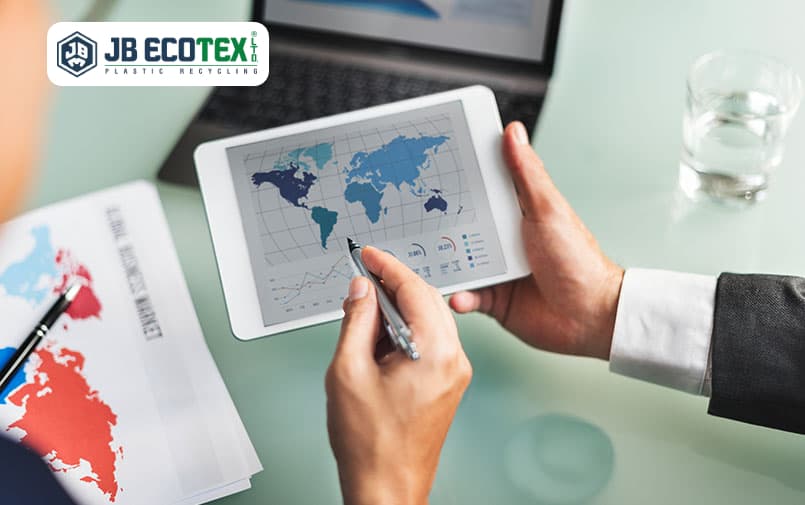
Global Markets for rPET Raw Material
India’s recycling system already processes over 90 percent of PET bottles collected, according to Fortune India. With new mandates, the share of rPET flakes in packaging will only grow.
By 2025, PET bottles in India must include at least 30 percent recycled content. By 2029, that figure rises to 60 percent. This creates steady demand for rPET raw material that is traceable and compliant.
Export markets are also expanding. Buyers in Southeast Asia, MENA, and Europe are sourcing rPET flakes from India due to their consistency and cost-efficiency. For manufacturers abroad, flakes offer a way to meet recycled-content rules without investing in large-scale sorting infrastructure.
Integrated Supply: From Flakes to RPSF and rPET Resin
At JB Ecotex, flakes are not only a product we supply. They are also the feedstock for our own polyester staple fibre (RPSF) and B2B rPET resin production.
This integration offers buyers confidence. The same flakes sold to converters are used internally to produce fibre and resin. It proves that the material works, that it blends smoothly, and that it is suitable for large-scale manufacturing.
Frequently Asked Questions on rPET Flakes
Q1. What are rPET flakes used for in food-grade packaging?
rPET flakes are used by B2B resin manufacturers to produce pellets that can go back into PET bottles and trays.
Q2. How do hot-washed PET flakes support sheet extrusion?
Hot washed flakes provide stable IV and low haze, making them suitable for thermoformed packaging and sheet production.
Q3. What is the difference between rPET flakes and rPET resin?
Flakes are shredded, cleaned inputs, while resin is a pelletised material made from flakes. Manufacturers often buy flakes to produce their own resin.
Q4. How do food-grade recycled PET flakes suppliers ensure compliance?
By testing every batch for PVC, IV, moisture, and metals, and providing documentation like CoAs and food-contact compliance letters.
Q5. Where can I source RPET raw material for export markets?
JB Ecotex supplies flakes to buyers across India, Southeast Asia, MENA, and Europe with traceable documentation and palletised jumbo bag shipments.
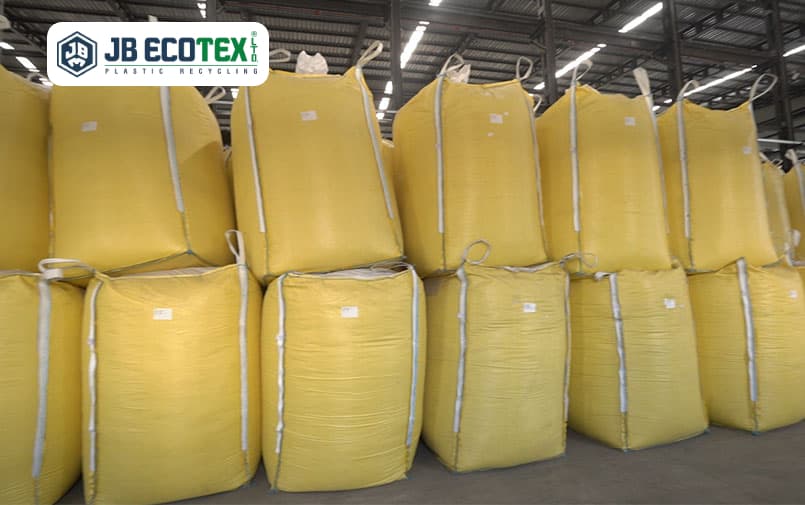
Why Packing Sustainability Starts With rPET Flakes
A discarded bottle can end up as a problem or as a resource. rPET flakes turn it into something valuable.
They become B2B resins for food packaging, sheets for thermoforming, yarns for textiles, and straps for industrial logistics. Every use reduces the dependency on virgin PET and supports regulations that are shaping the future of packaging.
At JB Ecotex, flakes are prepared for global manufacturing. Tested, traceable, and packed with care, they are designed to help converters, resin producers, and packaging brands meet today’s requirements and tomorrow’s goals.
If you manufacture packaging, fibre, or resin, talk to JB Ecotex about sourcing flakes that are ready for your process.
